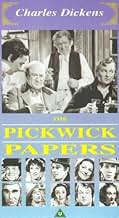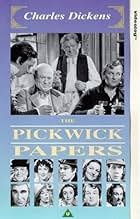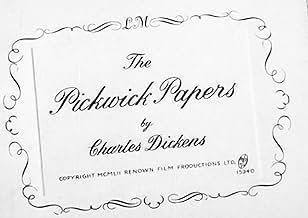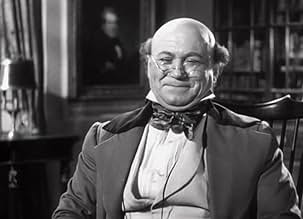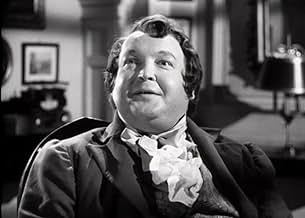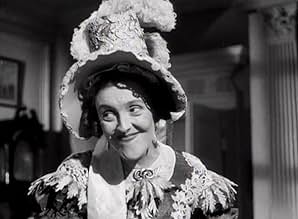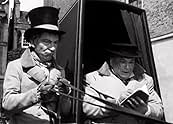Four wealthy Victorian gentlemen led by Samuel Pickwick set forth on an objective study of human behavior, thwarted by con artist Mr. Jingle and one of his schemes leading to Pickwick being ... Read allFour wealthy Victorian gentlemen led by Samuel Pickwick set forth on an objective study of human behavior, thwarted by con artist Mr. Jingle and one of his schemes leading to Pickwick being put on trial for breaking a promise to marry.Four wealthy Victorian gentlemen led by Samuel Pickwick set forth on an objective study of human behavior, thwarted by con artist Mr. Jingle and one of his schemes leading to Pickwick being put on trial for breaking a promise to marry.
- Nominated for 1 Oscar
- 2 nominations total
- Director
- Writers
- All cast & crew
- Production, box office & more at IMDbPro
Featured reviews
The Pickwick Papers was not only Dickens' first novel, it was among his lightest and funniest. Those who know Dickens only from his heavy, dark novels, such as of Oliver Twist and Nicholas Nickleby will find herein a much lighter and merrier Dickens, for The Pickwick Papers is very definitely a comedy
Nevertheless, however, Dickens' eye for characters and scenes is fully in evidence. Few novels can boast of so many memorable characters as The Pickwick Papers, and this film version certainly does them all justice. Nobody films Dickens like the British, and they've certainly done themselves proud here. The original Pickwick Papers was published as a magazine serial and came lavishly illustrates, and all of the actors have gone the extra mile to depict, as faithfully as possible, the characters as set down in the original novel.
The story is of a naive old gentleman who sets off to discover England, accompanied by three equally naive members if his club and his worldly Cockney valet. The misadventures of Mr. Pickwick and his friends, among the plethora of colorful characters whom they encounter, form the basis of the book. The production is not the most lavish, but the performance of every one of the large cast is spot-on perfect, and that more than makes up for a lack of budget. Those who have read the novel will love this version, even if is abridged. This who have not read the novel can still enjoy it for its many colorful characters and hilarious situations.
"Pickwick" is about 850 pages long, and has a shaggy dog construction. Dickens wrote a picaresque novel here, with the Pickwick Club members exploring England, and falling into many misadventures. They are supposed to be sending papers back to their club about their adventures, for they are a learned society. In one great moment in the novel (but not in the movie, unfortunately), they think they find a curiosity - a stone with the words "Bilst umpshi mark +). Their paper on this gains them immense public adulation for their scholarship, but one critic (who is kicked out of the Pickwick Club) investigates and says it should say "Bill Stumps, his mark "+". Nobody cares about the nay-sayer.
One aspect of the novel that is not in the film was Dickens addition of about seven or eight short stories the group hears or reads while on their tours. Dickens wanted to vary his novel, and he would do this again in "Nicholas Nickleby" briefly at the start of that novel. In 1841 Dickens began a large scale literary project called "Master Humphrey's Clock" in which Master Humphrey and his friends (including Samuel Pickwick, Sam Weller, and Tony Weller) tell stories, but two of the stories expanded into full scale novels: "The Old Curiosity Shop" and "Barnaby Rudge". After "Master Humphrey's Clock" Dickens never again wrote a book of just short stories (his "Christmas Novels" were not written and published together but over the years). An occasional short story like "Hunted Down" was published on its own.
The film is a nice distillation of the best sequences in the novel, such as the great lawsuit of "Bardell v. Pickwick" (Dickens first magnificent swipe at British law). Of particular notice in the film is the performances of Nigel Patrick as the trouble making scamp Jingle, and James Hayter as Pickwick (his only real starring role). Jingle (who's dialog looks like a telegram in the novel)is played as a charming rogue by Patrick. When he nearly gets Mr. Winkle (James Douglas) into a duel with two dyspeptic military doctors (with the immortal names of "Dr. Payne" and "Dr. Slammer"), after one diatribe from them Patrick riffles a deck of cards like a "Bronx Cheer". Hayter, a popular character actor in British film and television, had a smooth and warm sounding voice, and (in observing prison conditions) makes the phrase "How pitiable" actually sound correct for the first time. It is not the complete novel - which you should read and enjoy - but it is a nice introduction to it.
This film is adapted from the Dicken's source novel and restricts itself to some of the best sequences from the long tome.
You have the caddish Mr Jingle getting others in all sorts of scrapes including getting Mr Winkle involved in a duel. There are scenes of elopements and nearly elopements again with Mr Jingle trying to get away with the loot.
A misunderstanding leads to a court case involving a supposed broken promise of a marriage leading Dickens to have a swipe at lawyers and a sequence in a debtor's prison which suddenly switches the film from its comic mode to serious social issues of Victorian Britain.
James Hayter is very good as Pickwick, Nigel Patrick is a hoot as Jingle, Harry Fowler is memorable as Weller.
It is not the best adaptation of a Dickens novel from that era being rather low budget but amusing enough.
Did you know
- TriviaAlthough the film was released in England in 1952 and opened in New York in 1954, it was not nominated for Oscars until 1956, due to its not having played in Los Angeles until then.
- GoofsThe pony trap shown outside the coach-house is not the same pony trap that Mr Pickwick and others are seen riding on in the next scene.
- Quotes
Nathaniel Winkle: Gentlemen, Mr. Jingle is the viper in our midst.
Samuel Pickwick: Viper?
Nathaniel Winkle: Viper, sir.
Tracy Tupman: Nonsense, Winkle.
Samuel Pickwick: Nonsense, Winkle.
Augustus Snodgrass: N-nonsense, Winkle.
Nathaniel Winkle: Very well, then... we shall see.
- Crazy creditsClosing credits finish with The End of The Pickwick Papers
- Alternate versionsAlso available in a colorized version.
- ConnectionsFeatured in Arena: Dickens on Film (2012)
- How long is The Pickwick Papers?Powered by Alexa
Details
- Release date
- Country of origin
- Language
- Also known as
- Die wunderlichen Erlebnisse des Mr. Pickwick
- Filming locations
- Nettlefold Studios, Walton-on-Thames, Surrey, England, UK(studio: produced at)
- Production company
- See more company credits at IMDbPro
- Runtime1 hour 49 minutes
- Color
- Aspect ratio
- 1.37 : 1
Contribute to this page


